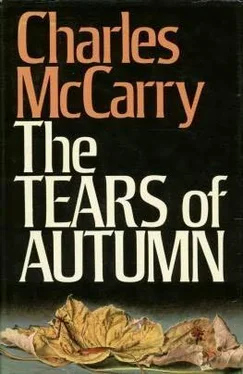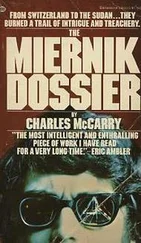“What was the cave?”
“Silence. He stopped speaking when he was about fifty.”
“Stopped speaking? Altogether? Why? Was he mad?”
“My mother thought so,” Christopher said. “So did I, for a while. Then I began to read a little more and I realized that he would have been treated as a holy man in most places in the world.”
“On the other hand, he could have been mad.” “That’s possible. He refused to give evidence.” “Not a word, not a gesture, to the end of his life?” “Nothing.”
“You behave as if you think what he did was rather beautiful.”
“Oh, I do,” Christopher said.
Christopher heated milk in the dark kitchen and drank a cup of cocoa before he woke Molly so that she could lock the door after him. She had slept naked and he embraced her long body, still warm from the blankets. He stood in the hall until he heard all the locks fall into place.
It took him ten minutes to inspect his car. It was still dark and he had no flashlight. He felt the motor with his hands and lay on his back on the cold cobblestones and ran his fingers over the frame. The car had been standing in the rain for a week and the engine started reluctantly.
Christopher drove up the Tiber, crossed it on the Ponte Milvio where Constantine had seen the sign of the Cross, and came down the opposite bank. The streets were empty. When he parked the car and walked into the cemetery, there was enough light to see the tips of the cypresses against a sky filled with sailing clouds.
He walked on the grass among the headstones to avoid the noise of his footsteps on the gravel pathways.
At precisely five o’clock, Klimenko, wrapped in his long overcoat, emerged from a row of cypresses. The Russian walked without hesitation to Shelley’s grave, and Christopher thought again about Klimenko’s tendency to make mistakes: he must have come to the cemetery the evening before and marked the spot.
“Good morning, Paul.”
“Gherman. Did you case this place last night?”
“Why?”
“You knew right where to find Shelley.”
“I came earlier this morning. No one has picked me up.”
Klimenko lifted his feet, in pointed Italian shoes, one after the other out of the wet grass. “Nevertheless, I’d like to get under cover as soon as possible,” he said. “All this standing about in the open isn’t good.”
“That grave over there is where Edward John Trelawny is buried,” Christopher said. “He snatched Shelley’s heart out of his funeral pyre on the beach at Viareggio. Later Trelawny was a secret agent in Greece with Byron. He thought Byron was a romantic amateur.”
“Dung,” Klimenko said. “Let’s go over to the trees.” In shadow, surrounded by the straight stems of the cypresses, Klimenko seemed more at ease. “What arrangements have you made?” he asked.
“If what you have is valuable, I can hand you over to someone this afternoon. They’ll tell you what to expect.”
“What will that be, roughly?”
“Safe transportation to the States, debriefing, a place to stay until you’re ready to surface.”
“I don’t want money,” Klimenko said. “That has to be made plain. No money.”
“All right, I’ll tell them. What do you have with you?”
“Your interest was aroused by Weedkiller. I’ve brought you something.”
Klimenko removed his hat and turned out the sweatband. He handed Christopher three small photographs and a slip of paper with a series of numbers and letters written on it in red ink. The photographs showed two men in dark American suits and white shirts crossing a sidewalk. One of the men carried a large attaché case. The cameraman had been sitting in a car: the angle of the door showed in a corner of the picture. The faces were very clear.
“What bank in Zurich is the account number for?” Christopher asked.
“Dolder und Co., in the Bleicherweg. It’s a small bank. This was a one-time usage.”
“Who are these people?” Christopher held up the clearest photograph.
“The men who made the withdrawal. They spoke American English.”
“Names, Gherman.”
Klimenko shrugged. “They were couriers. The names they used on the hotel register were Anthony Rugged and Ronald Prince.”
“Rugged and Prince? Come on, Gherman.”
Klimenko reached into his hat and handed Christopher photocopies of two Swiss hotel registration cards. “The cards are genuine,” he said. “What do names like that suggest to you?”
“Clumsy Americanization.” Christopher looked again at the men in the photograph; they had dark, closed faces; one man’s mouth was open, as if he had been chewing gum. “Probably Ruggieri and Principi originally.”
“Something like that. I saw the passports they handed in at the hotel-genuine. Their names are Rugged and Prince.”
“What was the million dollars for?”
“I don’t know. I carried it from Stockholm. It was brought to me from Moscow by the head of my section. I made the deposit, and my instructions were to put the money in the account and leave Zurich at once. Center wanted no surveillance on the messengers.”
“Why not? Is that your standard procedure?”
“No. Do you want me to explain the whole system now? Briefly, this is the only cash transaction in any amount I’ve ever handled where no receipt was required. I couldn’t believe the irregularity of it.”
“Why would they do it this way? A million dollars.”
“Obviously security was more important than money. It was a very tight operation.”
“You must have been given a deposit slip.”
“No-they wanted no paper of any kind. Not even in the files at No. 2 Ulitza Dzerzhinskogo.” Klimenko smiled bleakly when Christopher did not react to the address of KGB headquarters, spoken aloud.
“What was the withdrawal code?” Christopher asked.
“Also spoken, not written. To make a withdrawal, one cited the number of the account and gave the codeword tortora, which means ‘dove’ in Italian.”
“Why Italian?”
“I’ll come to that-it was an insecure code, there’s a clue in it. But you know how incautious these administrators can be.”
“Who accepted the money at the bank?”
“One of the directors, Herr Wegel.”
“Where is his office?”
“Second floor, extreme northwest corner of the building. His name is on the door.”
“Could you sketch the layout of the office from memory?”
“Yes,” Klimenko said.
He produced a notebook and a pen and made a quick sketch, resting the pad on a gravestone as he drew.
“What’s this?” Christopher asked, pointing to a scribbled feature on one side of the sketch.
“A fireplace,” Klimenko said. “Herr Wegel had a coal fire going-he made a joke about being an unthrifty Swiss. I remember everything. I was worried about the lack of documentation.”
“So you decided to take some pictures and ask some questions?”
“Yes. I’d already decided not to go back. I thought the information might be useful.”
“Why didn’t you just take the million and run?”
“Where to? Mars? Besides, Paul, to steal official money? Why should I do such a thing? What would they think?”
Klimenko still held his hat in his hand. Astonishment drew wrinkles on his bald head: he could betray his service and his country, but he could not bear that his colleagues should think him a thief.
“This is an intriguing little mystery,” Christopher said, “but I don’t see why it should interest us. It’s incomplete. All you’ve given me is evidence of a big cash transfer and a couple of photographs. The rest is not even speculation.”
“I can speculate, if you like.”
Christopher waited.
Читать дальше












